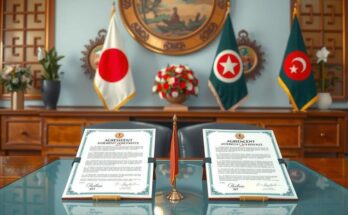Morocco ranked 91st globally in the 2024 Democracy Index, scoring 4.97 and rising two places from 2023. It is classified as a “hybrid democracy” alongside Tunisia, leading the Arab world in this ranking. Despite progress, challenges remain in achieving genuine democratic representation in the Middle East and North Africa, where authoritarianism is prevalent.
Morocco has achieved a noteworthy rank of 91st globally out of 167 countries in the 2024 Democracy Index, as reported by The Economist. The nation’s score of 4.97 reflects a rise of two places from its previous ranking in 2023. Over the years, Morocco has demonstrated consistent progress, increasing its score from 3.9 in 2006 to a peak of 5.10 in 2019 before experiencing slight declines in subsequent years.
The Democracy Index evaluates democratic governance through five primary indicators: electoral process and pluralism, government performance, political participation, political culture, and civil liberties. Morocco has received the following individual scores: 5.25 for electoral process and pluralism, 4.29 for government performance, 5.56 for political participation, 5.6 for political culture, and 4.12 for civil liberties.
In the Arab region, Morocco, along with Tunisia, falls under the classification of “hybrid democracies,” with other nations categorized as authoritarian regimes. Among these, Morocco ranks first in the Arab world, placing ahead of Tunisia (93rd globally), Mauritania (108th), Algeria (110th), and Palestine (112th). Within the broader Middle East and North Africa region, Morocco stands second, surpassed only by Israel (31st globally).
Globally, Norway ranks first, followed by New Zealand, Sweden, and Iceland; Switzerland, Finland, and Denmark also feature in the top seven. Conversely, North Korea, Myanmar, and Afghanistan occupy the lowest positions. The report indicates that representative democracy is scarce in the Middle East and North Africa, noting, “Only Israel practices full democracy. Most regimes introduce limited political representation to appease demands for reform while maintaining centralized control.”
Moreover, it highlights the existence of “superficial democratic facades” in Iraq and Lebanon, which operate under rigid sectarian frameworks, as well as in constitutional monarchies such as Jordan and Morocco, where political structures predominantly favor the monarchy. Additionally, regimes like Egypt, Oman, and Saudi Arabia maintain only nominal parliamentary systems.
The report emphasizes that the MENA region records the lowest scores in electoral processes and pluralism, reflecting systemic issues in political representation. On a global scale, average democracy index scores have declined from 5.52 in 2006 to a new low of 5.17 in 2024. A staggering 39.2% of the world’s population presently lives under authoritarian rule, with the number of authoritarian regimes rising to 60 since 2014.
In conclusion, Morocco’s ascent in the 2024 Democracy Index highlights its position as the leading hybrid democracy in the Arab world. Despite its advancements, the country still faces challenges typical of the region, where genuine representation often remains elusive. The general trend indicates a worrying global decline in democratic practices, underscoring the need for continued reform and vigilance.
Original Source: en.yabiladi.com




